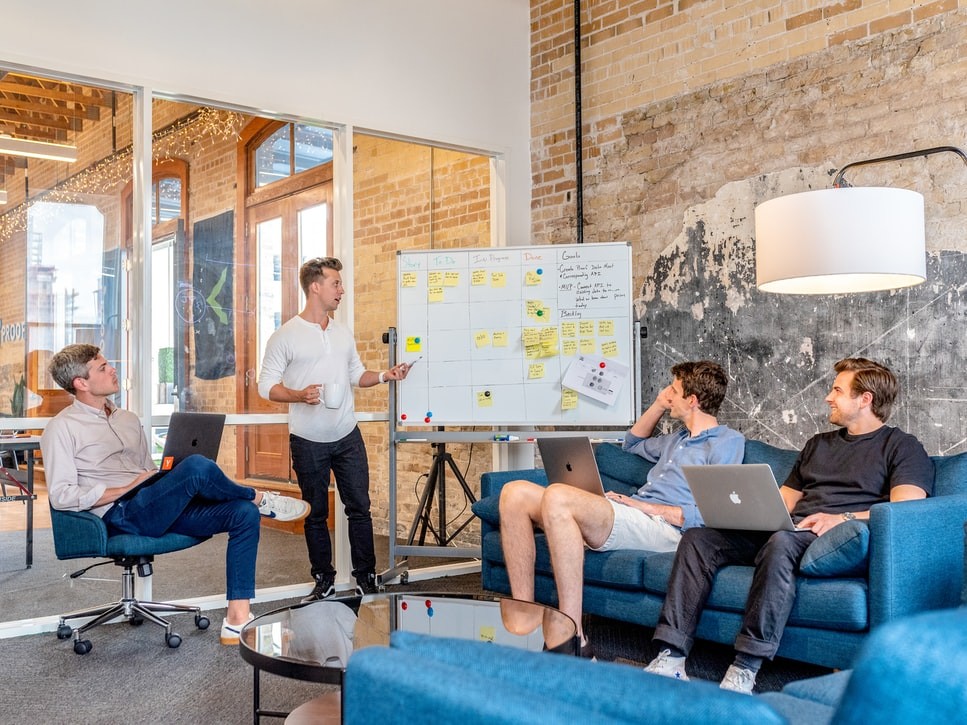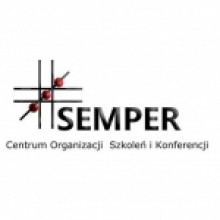

W imieniu ekspertów Centrum Organizacji Szkoleń i Konferencji SEMPER z przyjemnością zapraszamy do udziału w szkoleniu otwartym:
On behalf of the experts of the SEMPER Training Organization and Conference Center, we are pleased to invite you to participate in the open training:
TEAM MANAGEMENT FOR PRACTITIONERS. 2 -days workshop.
Grupa docelowa
Participants
The workshop is dedicated to
• a Team Leader or soon to be one who wants to improve its skills
• a Team Member who wants to know how a team should be developed and ran by itself
• a high level manager who needs its people become better Team Managers
Cel szkolenia
Goals
• essential knowledge of what does “a Team” and team maturity development mean
• better understanding of team collaboration, leadership and team management
• improved knowledge and skills how to use and implement team management and team collaboration tools and techniques
o team development and team structure
o teamwork good practices and tools
o how to fit management style and leadership to a team environment and its maturity level
o communications and relationship development
o individual and group motivation and motivators
o dealing with difficult situations and with conflict
Korzyści dla uczestników
Benefits
The "TEAM MANAGEMENT FOR PRACTITIONERS. 2 -days workshop" is very interactive with many examples, discussion,analysis, and hands-on small group exercises.
Metodologia
Szkolenie on-line
Working methods during on-line training:
Metody pracy podczas szkolenia on-line:
Program szkolenia
Programme
Program szkolenia stanowi prawnie chronioną własność intelektualną, a jego przetwarzanie, rozpowszechnianie lub korzystanie z niego bez wiedzy i zgody autora jest zabronione.
Programme
Program szkolenia stanowi prawnie chronioną własność intelektualną, a jego przetwarzanie, rozpowszechnianie lub korzystanie z niego bez wiedzy i zgody autora jest zabronione.
1. leader or manager
• key tasks and responsibilities
• formal and informal leader
• sources of authority
• how to build authority
• management faults and traps
2. discussion and analysis
• our team environment
• case study
3. techniques and good practices
• directing and managing by Stephen Covey
4. team – something more than group of people
5.a team
• who is a team member and what is a team
• formal structure
o roles
o tasks and responsibilities
• skills diversity of team members
6.discussion and analysis
• our team environment
• case study
7.techniques and good practices
• social roles by Meredith Belbin
• difficult personalities and how to deal with
8.teamwork
• task definition and issue analysis
• solution finding
• team decision
• task planning and tracking
• daily collaboration
9.discussion and analysis
• our team environment
• case study
10.techniques and good practices
• brainstorming
• spiderweb decision analysis
• retrospective
• tables, visualisations
• effective meeting management
10.team development
• defining a team goal and team planning
• team development dynamics
• situational management
o by project stage
o by team maturity
o by team environment
• team development faults and traps
• leader role in self-managing team
• delegating to people and to a team
11.discussion and analysis
• our team environment
• case study
12.techniques and good practices
• SMART
• RAM/RACI
• group development stages by Bruce Tuckman
• managerial grid by Robert Blake and Jane Muton
• leadership styles by Daniel Goleman
• situational leadership by Ken Blanchard
13.communication – collaboration key tool
• prepare deliberate relation
• communication planning – fundament questions
o why? what for? to whom? what? how? when?
• principles of good communication
14.active relation
• first steps
o halo effect
o the first contact, the first meeting, the first experience
• dialog – exchange of information
• discussion – from understanding to a decision
• close conversation and maintain relation
15.active conversation
• active – conscious talking
• statements, questions, answers ..
• conversation supporting
• information hidden in emotions
• maintain relation
16.what we say and what we hear
• active listening
• misinterpreting
• rationality and rationalization
• communication noise
17.discussion and analysis
• our team environment
• case study
• self-presentations, improvised scenes
• team analysis of the recorded presentations
18.techniques and good practices
• 4 ears, statement structure, square of values by Friedemann Schulz von Thun
• active listening
19.motivation vs motivating
• why we want to go to work every day – our motivators and our team motivators
o extrinsic motivators
o intrinsic motivators
o incentive system
o team motivators
o motivation faults and traps
• inspiring feedback
o neutral information – leader must be with his/her team
o praise i.e. congratulations
o difficult talk – blaming or solution finding
20.discussion and analysis
• our team environment
• case study
• self-presentations, improvised scenes
• team analysis of the recorded presentations
21.techniques and good practices
o hierarchy of needs by Abraham Maslow
o hygiene factors and motivators by Frederick Herzberg
o research results from The Gallup Organization
o team demotivators by Patrick Leoncioni
o “punished by rewards” by Alfie Kohn
22.difficult situation, conflict
• change – hard time for people and teams
o emotions and reactions
o how to support people during change
• when emotions are increasing
o from a dialog to a row
• misunderstanding is not a row – just solve it
o “You” statement
o “I” statement – open to understanding and agreement
• conflict background
o what I say and what you understand
o over-interpretation – dialectical arguments
o to strong emotions
o people play games
• communications – key tool to solve a conflict
• conflict result – benefit or loss
23.discussion and analysis
• our team environment
• case study
• self-presentations, improvised scenes
• team analysis of the recorded presentations
24.techniques and good practices
• reaction to a change
• matching and mirroring by Thomas Gordon
• active listening
• conscious talking
• “I” statement – FECE
• devils circle by Friedemann Schulz von Thun
• transaction analysis by Eric Berne
• conflict Harvard model
25.summary
26.discussion
• what I have learnt, and what I can implement tomorrow
• what to improve, what to avoid
W przypadku szkolenia w formule on-line modyfikacji mogą ulec forma i sposób realizacji zaplanowanych dla Państwa ćwiczeń.
Zgłoszenie
Aby zgłosić chęć uczestnictwa w szkoleniu prowadzonym przez Centrum Organizacji Szkoleń i Konferencji SEMPER należy uzupełnić formularz zgłoszenia online lub wydrukować kartę zgłoszenia, a następnie po jej uzupełnieniu odesłać faksem (61 6 247 936) lub mailem (info@szkolenia-semper.pl).
Po otrzymaniu przez nas zgłoszenia skontaktujemy się z Państwem maksymalnie w ciągu 2 dni roboczych w celu potwierdzenia rezerwacji.
Kontakt
Contact in English
Dharmesh Kesaria
Business training in English
Centrum Organizacji Szkoleń i Konferencji SEMPER
d.kesaria(at)szkolenia-semper.pl
Zachęcamy do kontaktu telefonicznego i mailowego.
Chętnie odpowiemy na wszelkie pytania:
Centrum Organizacji Szkoleń i Konferencji SEMPER
SZKOLENIA | KONFERENCJE | DORADZTWO
ul. Libelta 1a/2
61-706 Poznań
Godziny pracy biura: Pn-Pt 08.00 - 18.00
Departament szkoleń otwartych:
tel. 690 059 155
tel. 508 393 926
tel. 577 177 547
tel. 733 544 190
tel. 570 590 060
tel. (61) 3070303
tel. (61) 8102194
tel. (61) 4152036
tel. (61) 4152810
tel. (61) 4152820
fax. (61) 6 247 936
fax. (61) 2 786 300
info@szkolenia-semper.pl
www.szkolenia-semper.pl
Najważniejsze powody, dla których warto wybrać organizowane przez nas szkolenie:
1. Centrum Organizacji Szkoleń i Konferencji SEMPER jest jedną z wiodących firm szkoleniowych w Polsce.
2. Naszym celem jest zapewnienie Państwu elastycznych rozwiązań doradczych i dostosowanych szkoleń w celu osiągnięcia rzeczywistych rezultatów i efektów w pracy zawodowej.
3. Gwarantujemy zajęcia prowadzone przez najlepszych w kraju specjalistów.
4. Liczne referencje i opinie potwierdzają wysoką jakość naszych usług: referencje
POLITYKA RABATOWA
Przy zgłoszeniu 2 -4 uczestników nasza polityka rabatowa przewiduje 10% zniżkę.
Przy zgłoszeniu 5 lub więcej uczestników nasza polityka rabatowa przewiduje 15% zniżkę.
Uwagi
Powyższy program rozwojowy jest również dostępny w formie zamkniętej, wyłącznie dla pracowników Państwa firmy. W przypadku szkoleń zamkniętych zakres tematyczny poszczególnych bloków może ulec zmianie, ze względu na rzeczywiste, zdiagnozowane w ramach analizy przedszkoleniowej oczekiwania pracowników i potrzeby organizacji zlecającej szkolenie. Gwarantujemy wysoką jakość merytoryczną i organizacyjną szkolenia. Aby uzyskać więcej informacji dotyczących zamkniętej formuły szkoleń prosimy o kontakt: info@szkolenia-semper.pl lub zachęcamy do skorzystania z formularza zapytania ofertowego.




















































